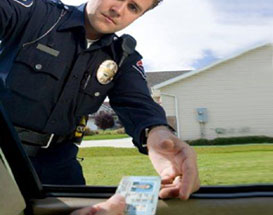
This has come up a couple of times lately. Drivers don’t seem to know that if they don’t respond to tickets they are subject to a default judgment which causes a suspended drivers license. It is against the law to drive on a suspended license–you get arrested. It is a common arrest and done by police everywhere.
Click here for the statute.
In the recent case where our officer was hit by a driver who refused to be arrested, she acknowledged that she had a traffic ticket she didn’t pay. In fact, if she couldn’t pay or didn’t want to contest the ticket there are alternatives that can be set by the court, but it is important to contact the court within the time limit set on the bottom of the ticket. If you fail to respond to the ticket or by its other name: summons (as in, “you are being summoned to court”) the court finds you in default and suspends your license to drive. You get a letter and the court notifies the Secretary of State who puts the suspension into their computer system. If a police officer runs the plate on your car –and they can do it for any reason–there isn’t a right to privacy on your license plate which is plainly visible to anyone driving down the road–it will tell the officer that the registered owner has a suspended license. If you are the registered owner and the officer confirms that by looking at your license he or she must take the license and arrest you for driving while suspended.
It is the kind of arrest that we see all the time. The driver is detained for 30 minutes or so while the ticket is written. The car may be towed if it is on the roadway or it can be parked in a nearby parking lot and locked up. If we take charge of it we will search it pursuant to impound –in other words if we have custody we have a right to know what it is in it so that your personal property can be protected. So we search and complete a form detailing the contents of the car. If something is missing later we know what was there when we had it. But you get a tow bill which won’t be cheap.
Another driver we stopped and arrested for the same thing acknowledged to the officer that he knew he had an outstanding ticket. He said he went to the Pontiac court but there was no record so he thought he was ok as a result of a paperwork problem. Turned out not to be the case — our tickets go to the Rochester Hills Court 52nd-3rd, which is written on the bottom of the ticket. He was arrested but to his credit he cooperated on the scene. I hope he went to court to contest the ticket–which is his right–or made some other arrangement with the court.
Would it make sense for all the court records to be connected so you could go to a court near you and at least find out what court you needed to appear in or pay your ticket near you? Yes, it would make sense and yes it would be convenient and yes it could be done but no it isn’t possible now. If you want to pay a ticket on line you can for some courts. Click here: Pay your ticket on line
I don’t disagree that it is a crazy system. But what are officers to do? I guess we could stop writing tickets but is that what you really want? The person who ran into your car while speeding doesn’t get a ticket?
What is important here is responding to tickets. If you don’t have the money to pay, still contact the court. You could be assigned to driving school or make payments but if you ignore it your license will be suspended and fees and costs escalate rapidly. I do know that once you are in the system with a suspended license it is extremely difficult and expensive to get out.
We are concerned about how expensive tickets have become. You can see by the incident last Friday morning where our officer was injured on a traffic stop, that the police are taking the brunt of the public’s ire around this issue. Our state like Missouri is a “pay or play” kind of system–if you don’t pay the ticket you can be arrested. Better than Missouri, we don’t take people to jail from the scene–we issue another ticket but theoretically a judge could send you to jail if you are driving while suspended for a number of days. I get the problem with that.
No matter what–the street is not the place to settle differences. The ticket can be dealt with in court. We ask people to cooperate for the safety of everyone.
This post was originally published on November 2, 2015 on Director Olko’s blog.